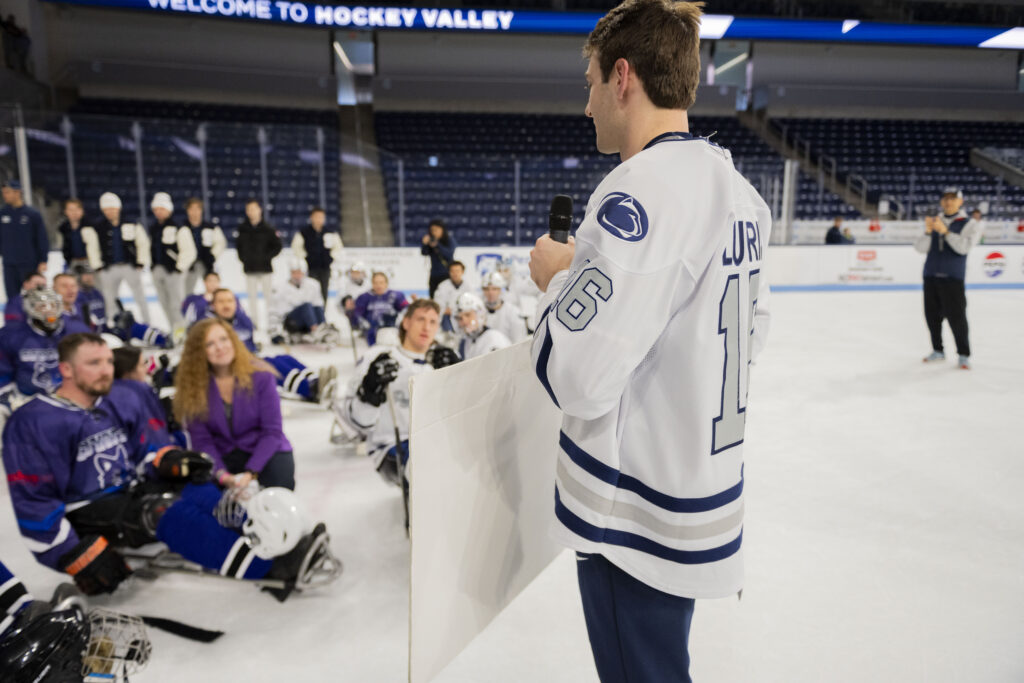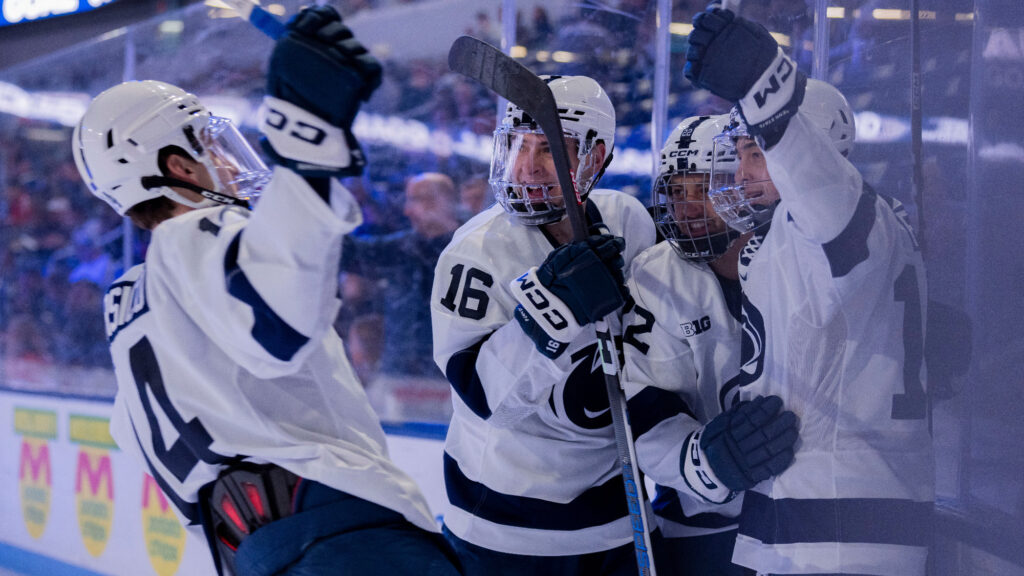Dylan Lugris has helped to grow the State College Coyotes sled hockey team, all while getting on a sled himself to join the Coyotes players (photo: courtesy Dylan Lugris).
Game recognizes game. And every so often, game helps game level up.
Over the past few years, a local sled hockey team in State College, Pennsylvania, has developed a fan following among Penn State’s men’s hockey program. Nittany Lions coach Guy Gadowsky approached the State College Coyotes, who practice out of PSU’s Pegula Ice Arena, to ask if he could hit a sled with them. He then encouraged his own players to do the same.
Among them was Penn State junior forward Dylan Lugris, who has now organized two editions of the Penn State Sled Hockey Classic, pitting his team against the Coyotes. Lugris’ work to put on an event that has gone from strength to strength has helped him become one of five finalists this year for the Hockey Humanitarian Award.
“I had started going to those practices with a couple of the guys on our team, and over time, I started to develop some good relationships with the Coyotes and was asking them questions and wanted to see if they played any games or how their season looked and how they ran their program,” Lugris said.
“When they told me they don’t get to play games because it’s expensive to travel and get people place to place, I thought, ‘We’ll play you here. We’ve got enough guys that we’ll play here and try to raise some money for next year so that you can travel and build the program.’”
Lugris got the green light from Gadowsky to spearhead the project, and in February of last year, the first Penn State Sled Hockey Classic was held. The game was held in front of a crowded Roar Zone, Penn State’s hockey student section, with Nittany Lions players putting on the whole show between playing, coaching the teams, officiating the game, ushering for fans and even running the scoreboard and public address system. A second edition of the event was held last month, and in terms of what happened on the ice, there was more to keep track of.

Dylan Lugris talks to the State College Coyotes sled hockey team, looking to encourage the players and pass on his knowledge of the game (photo: courtesy Dylan Lugris).
“The first year we did it, they only had nine or 10 people in their program, and it was easy to do us versus them, but this year, since we raised money and grew the sport a little bit, they actually grew their program to 22 players,” Lugris said. “We had line changes this year, and one of their players played for us because it was always a dream of his to play for Penn State, so Gads played for the Coyotes in a little trade.
“All our guys got involved, and when I brought it up to them the first time, they were all for it. The way we had to schedule it, we could only do it on a bye week and had to do it in a morning, so to get the response that we did of, ‘How can we help, what can we do,’ at 9 a.m. on a Saturday when we’re supposed to be off says a lot about who they are and our culture.”
The annual event has helped the Coyotes in other ways, too. They are now proud members of the Northeast Sled Hockey League and play in multiple games per month thanks in part to the nearly $50,000 that Penn State’s players have raised for the club over the past year.
Lugris credits Penn State staff members for helping behind the scenes, but all game day preparation and in-arena work was done by PSU players. And both times, the event exceeded Gadowsky’s expectations, because of the scale of the project.
“I thought Dylan had great intentions, but I didn’t think there was any way he would make it happen, because he basically said, ‘If I can do it, can I do it?’ I said, ‘Yeah, go ahead, but it’s all on you. If you can get it done, that’s great,’” Gadowsky said.
“I knew it would take organizing for both our team, the sled team, ice time and I didn’t know how he would do it with all the people it took, but he motivated our entire team to want to partake in it, and it was a first-class event. It was everything you could imagine.”

Dylan Lugris (16) and teammates celebrate a goal for Penn State (photo: Penn State Athletics).
And it would’ve been eye-opening for fans and players who were new to the world of sled hockey. In at least one instance, a fan looks set to become a player.
“It’s really tough, man,” Lugris said when asked how he has found the experience of playing sled hockey. “It’s a lot of core strength, your arms are tired and it’s faster than you would think, and more physical, too. I’ve gone most Sundays that I can make since my freshman year, and I’m still not very good, but it helps grow the sport, too. When fans see Division I athletes go out there and not be able to play sled hockey, even though they’re Big Ten athletes, it shows how athletic these sled hockey players are, no matter their disability.
“Just seeing their program almost triple in size was incredible, but one of our assistant coaches, his son is around 8 years old and had his birthday party that day this year, and he brought his friends and one of them is disabled. This kid went to the event, had a blast and when they had practice again the following day, he showed up and wanted to be a part of it. Little things like that really go a long way. Seeing a kid go to a birthday party and finding out that this is something he can enjoy and do for the rest of his life is really powerful.”
Lugris is studying corporate innovation and entrepreneurship at Penn State, and has another year left with the Nittany Lions. Plans are already in place for the next edition of the Penn State Sled Hockey Classic, and for future editions after Lugris has moved on, but he will be long remembered for what he put in motion.
“I don’t want to downplay the money raised, because that was certainly significant for a lot of reasons, but there was so much that was so much more impactful,” Gadowsky said. “The feeling of the whole day is awesome, and I really love the fact that our entire team gets behind it, our community gets behind it and that the exposure has helped transform the Coyotes program. That feels really great that Dylan was a catalyst for that.”